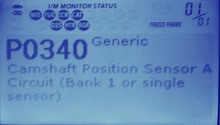Ford Mustang GT 1996-2004: Fuel Information
A Ford Mustang GT is a fantastic car, which, if properly maintained, can provide you with a superb driving experience. One of the easiest ways to ensure your vehicle is being well taken care of is to fill it up with the right fuel for its engine. If this is an unfamiliar topic for you, then read on to learn some of the basic differences between fuel types, so you know which one you should be paying for at the pump.
This article applies to the Ford Mustang GT (1996-2004).
While we’re all familiar with gas prices, less understood is what the different types of gas do for our car. What’s the difference between a fuel with an Octane rating of 87 and one that’s 93? And what’s E85 all about? Can you use it in your Mustang? If you’ve ever found yourself pondering these queries while rolling down the road, read on for a better understanding of what, exactly, it is that you are putting in your car.
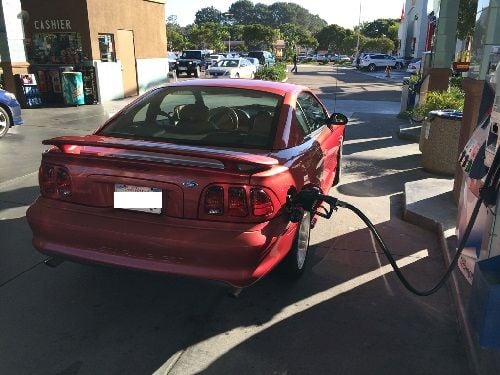
What is Fuel Octane?
If you’ve ever gone on a forum discussing Ford Mustangs, chances are you’ve come across a conversation or two on Octane fuel, and which rating is better for what model. In case you’re unfamiliar with what Octane means—and why it's important to a car with a high performance engine like a Ford Mustang GT 4.6—let's start from the beginning.
The Octane rating of gasoline tells the driver how much of the fuel can be compressed before it spontaneously ignites. When ignition happens due to compression (rather than spark from a spark plug), it causes knocking in the engine which, in turn, damages the engine. Generally speaking, lower-Octane gas (e.g. regular 87-Octane gasoline) can handle the least amount of compression before igniting. As such, it’s viewed as the most risky type of gasoline for an engine’s long-term health.
In terms of the Mustang, specifically, we’re talking about a vehicle with a high-performance engine; this means it offers more horsepower, and thus has a higher compression ratio than the average car on the road. As such, it requires a higher-Octane fuel to (a) allow it to perform to its peak capabilities and (b) avoid damaging its specially designed engine.
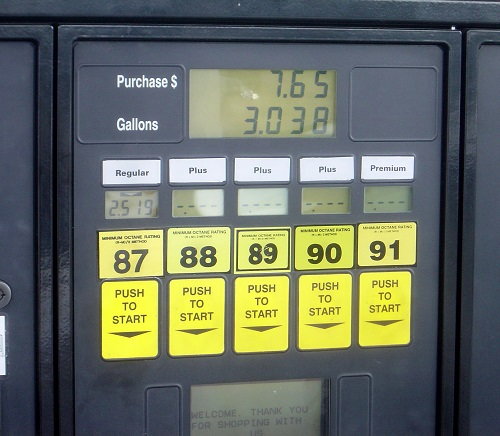
Does My Ford Mustang GT 4.6 Engine Really Need Premium Fuel?
Here's what it boils down to–if your engine is specially tuned for a higher compression ratio, than you should consider using higher Octane/premium fuel. If, on the other hand, your engine is stock and has the same amount of power as the average car on the road, then no, you do not need to fill up on the more expensive gasoline.
Explaining the first point in a bit more detail, we’re talking about an engine that is specially tuned to advance the engine’s spark timing to make the most of the fuel’s extra octane—remember, higher Octane fuel means greater resistance to ignition-by-compression, which results in the engine’s ability operate at a higher compression ratio. And since a higher compression ratio is a direct multiplier to the overall efficiency of the engine, the fuel can positively impact the overall power output of the engine.
So as the owner of a Ford Mustang GT, unless your owner’s manual states otherwise, to maximize your car’s power output, you should fill it with 91 or higher.
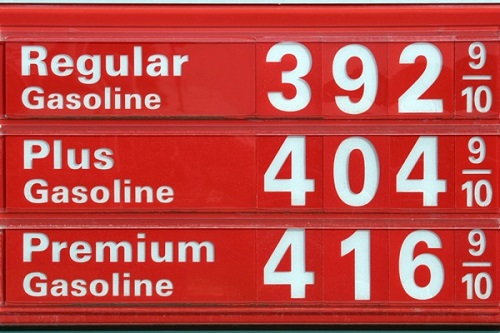
Can I Use Alternative Fuels Like E85 in My Ford Mustang GT 4.6?
So, here’s the thing with E85 and running it in your Mustang—it’s like running race fuel in your car. E85 is approximately equivalent to 110 Octane, and is routinely used as a budget form of race gas (100+ Octane). However, much like any grade of high Octane, the benefit is only there if the vehicle is tuned for it. If your car is a high compression, turbocharged, or otherwise fully modified car specifically tuned to benefit from E85, then by all means, enjoy it! However, if your car is stock, or more specifically, not using aftermarket tuning software, then there will be no benefit to running E85 or race fuel in your Ford Mustang.
If you’re interested in making your Mustang E85-friendly, than you’ll want to purchase/install an E85-focused fuel pump, and 30 lb injectors for your car’s engine. It’s several hours of labor to modify the car in this sense, for the purpose of, in theory, saving a few cents per gallon at the pump, but as pointed out earlier, it’s probably not worth it because you wind up burning through the gas faster.
Yes, E85 specifically is cheaper than regular fuel, but you’re also burning through it much, much more quickly than the other gases. In fact, you’ll burn through a tank by about 25-30% faster than the other gases. This is because the vehicle is not outfitted with proper injectors, fuel components, and components necessary to take advantage of the E85 fuel. In the long run of things, though, you won’t damage your car using it, but you also won’t save money using E85 because you’ll wind up taking more trips to the gas station to fill up than if you were to use a more appropriately rated gasoline.
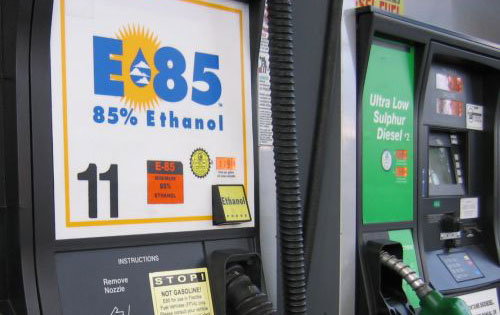
Related Discussions
- Will My ‘03 GT Run on e85? - MustangForums.com
- Do I Need Premium Gas in GT? - MustangForums.com
- What Octane Gas Do I Need to Use for 96-04 GT Mach 1 Cobra? - MustangForums.com
- Can I Run Premium Fuel in My 99GT? - MustangForums.com
- What’s Your Thoughts on Premium Gas? - MustangForums.com



